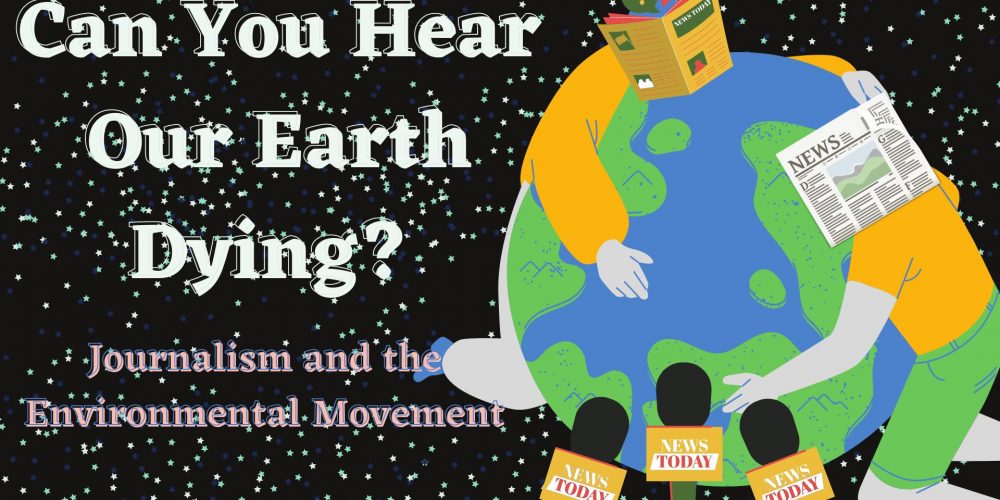Does this headline catch your eye? Is it shocking? Is it scandalous, relatable, something you are worried about?
I never understood why I had to make a catchy headline; I always loved to read anything even if the headline was boring and dull. Give me a news article called “subsidiaries in the oil industry and their effect on integrated ecosystems” and I would happily read it with my morning coffee. Maybe, I am unique in that regard, but I think it has more to do with an ever-present desire to absorb content. I want my brain to full of objective information and I want to share it with others, thus my position at Alternatives Journal.
Although, I quickly became curious about this topic. Not so much the evolution of headlines, but rather the evolution of journalistic media into the subjective and sensational industry it is currently. I also wanted to understand how this style of reporting has affected the promotion/relevance of environmental issues. I was already interested in environmental communication, from a purely scholarly perspective. But I also know that if no one talks about climate change because it is not “interesting” enough then we have a real problem on our hands.
I first stumbled upon a report published by the RAND Corporation in 2019, called “News in a Digital Age: Comparing the Presentation of News Information Over Time…”. The study was analyzing how the style of news presentation in print journalism and broadcast journalism changed between 1989 to 2017. It also analyzed how online journalism differed from print journalism (in the 2012 – 2017 period). The report was published in a series of studies, researching how media (in its presentation of facts, data, etc.) affected society’s political/civil discourse.
The key findings of this particular report that are of interest in this article were thus:
- Print journalism has made significant shifts to being more subjective (opinion-based). Stating specifically that there were “meaningful shifts” away from a focus on events, time, and other strict details toward a more narrative approach (with more personal perspective and emotion)
- Online journalism has become a “subjective advocate”. It is more direct and personal than print media and likely takes an advocate role in any social issue.
Interestingly, subjective journalism might reduce the trust between readers and media, as it is more personal and might reduce fact-based content. To which I argue that I started this article with personal information in hopes that it might connect me to you (my wonderful reader) and encourage you to read further. Often people look for a story with people they can relate to or at the very least sympathize with. For example, if you were reading about a theft of a small business in your locality would you only want the strict details of the crime, OR would you also want comments on how the owners were affected as well? In my opinion, subjectivity leans towards humanity. It is simple we should write like a human to cater to our human readers.
This thought is further corroborated by other sources as well. The book “Beyond News: The Future of Journalism” written by Mitchell Stephens, states that journalists should take the role of an appropriately opinionated analyst, rather than a strict teller of details.
However, in the scurry of remaining relatable and interesting, online and print reporting has also taken a turn towards requiring a “shock” feature. Another way, journalism has shifted greatly in the last few decades has to do with a tantalizing term – media sensationalism. As one article describes it, today’s journalism is solely focused on the expansion of truth to appear more “exciting and dramatic”, largely in efforts to gain higher ratings and views on any published article. This includes making clickbait-style headlines and often over-reporting on a story that has garnered mass attention in its initial publication. This style of repetitive publishing has often been seen in news media about acts of mass violence.
The danger of sensational journalism is that it often ignores seemingly “dull” stories that will not make for a good story much less a catchy headline. In this regard, important and pressing matters such as smaller events connected to climate change are often not reported on heavily or at all and are ignored until a greater calamity arises. For example, a report on subnormal algae blooms in Lake Eerie does not get attention, even though it speaks to a larger issue of global warming and the pollution of our lakes.
It will likely take something drastic, such as the contamination of drinking water in the communities or mass amounts of biodiversity loss in the lake to actually get the attention of media circuits. This lack of reporting also leads to less motion by governance bodies, who often respond directly to pressure from the public and media attention on social/environmental issues. All of which leads to a cycle of inaction that allows smaller environmental problems to build into larger, less manageable, environmental disasters. It takes a few little fires, to create one large unstoppable wildfire, and this same ecological ideology can be applied to the effect of environmental journalism.
This begs the question, what should environmental reporting and media actually aspire to be? To which I would say that particular thought process is pointless. We cannot correct decades of sensationalism, nor should we attempt to correct subjectivity in writing (proven to be helpful in all manner of reporting). Instead, I would ask consumers of media to expand their horizons in what they read.
As one article published in the Ecologist suggests, support independent media (such as A/J) by sharing and promoting their content in order to create a progressive and environmentally aware collective. The next environmental movement might very well lie within the words of countless articles online and on social media. But I would like to think that it actually begins in you and what stories you want to read.
I hope selfishly that it is mine and other dedicated publications, striving to make the small fires a BIG deal. What a scandalous thought, am I right?














